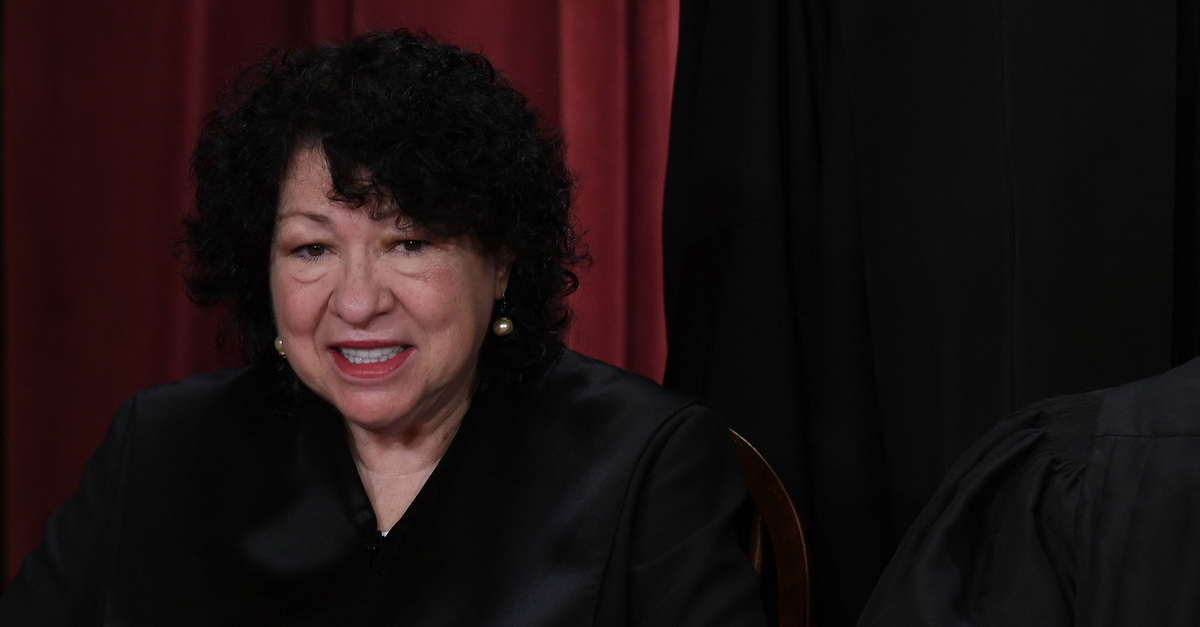
Associate US Supreme Court Justice Sonia Sotomayor poses for the official photo at the Supreme Court in Washington, DC on October 7, 2022.
In a talk Wednesday night, Supreme Court Justice Sonia Sotomayor told law professors she felt “shell-shocked” and “deeply sad” about the Court’s June 2022 term. Though the justice did not mention the Dobbs ruling, her dissent thereto, or the leaked decision by name, many understood her comments to reflect directly on her feelings about the Court’s landmark ruling that overturned Roe v. Wade.
Sotomayor spoke via videoconference to the Association of American Law Schools at an event held at the University of California, Berkeley School of Law. Renowned constitutional scholar and Dean Erwin Chemerinsky moderated.
Before the Dobbs decision, Chemerinsky called abortion the most divisive issue facing Americans today. “There is no middle ground between those who believe women should have the right to control their bodies and choose whether to terminate a pregnancy and those who believe abortions are murder,” he noted. After the Court ruled 6-to-3 to reverse Roe, Chemerinsky said that Dobbs would be the decision for which the current Court was “most remembered.”
Sotomayor confided in Chemerinsky, “I did feel hopeless about the direction my court was taking,” but she pledged that she would continue to “tilt at windmills” and dissent, even as the Court becomes more conservative.
“To give in to despair is not an option,” the left-leaning justice said. “I must get up and continue fighting.”
Sotomayor’s oblique references to the Supreme Court’s restriction of First Amendment protection for abortion came just a day after the federal Food and Drug Administration (FDA) expanded access to medication abortions by changing a rule Sotomayor slammed in a passionate dissent in 2021.
The FDA, via update to its website Tuesday night, changed regulations to allow mifepristone to be dispensed at retail pharmacies.
Mifepristone, also known as RU-486, is the first pill in a commonly-used two-medication abortion regimen (the other medication is Misoprostol, which is less restricted due to its non-abortion usage). Until the change Tuesday, it could only be dispensed by a small number of specialty pharmacies and clinics. Under the new rules, a doctor’s prescription would still be necessary, but any pharmacy that accepts those prescriptions can dispense the pills both in-store and via mail. The current shift in FDA rules means that for the first time, major retail drugstore chains such CVS, Rite Aid, and Walgreens, will be permitted to offer mifepristone.
The FDA’s change would have been of particular note to Sotomayor, who railed against the agency’s past requirements in a January 2021 ruling.
The Trump administration FDA had adopted a rule to bar access to mifepristone by forcing women to go in person to a medical provider in order to obtain the pill — and refused to relax the requirement even as the COVID-19 pandemic raged. The Supreme Court ruled that the FDA was under no legal obligation to change its policies.
Sotomayor, however, issued a scathing dissent from the Court’s decision which called the FDA’s requirements for mifepristone “unnecessary, unjustifiable, irrational, and [an] undue burden on women seeking an abortion during the current pandemic.” The justice took aim at the Trump administration’s inconsistent positions, which seemed to take COVID risks into account sometimes, but “refused to extend that same grace to women” in the context of abortions.
Insisting that women make an in-person trip to a pharmacy to obtain mifepristone was especially harmful to communities of color, said Sotomayor in 2021.
“[M]ore than half of women who have abortions are women of color,” said the justice, noting that the mortality rate for COVID was three times higher for minorities than for white individuals.
“On top of that, three-quarters of abortion patients have low incomes, making them more likely to rely on public transportation to get to a clinic to pick up their medication. Such patients must bear further risk of exposure while they travel, sometimes for several hours each way, to clinics often located far from their homes,” Sotomayor added.
Mifepristone is authorized by the FDA for use during the first 10 weeks of pregnancy.
[image via Olivier Douliery/AFP via Getty Images]